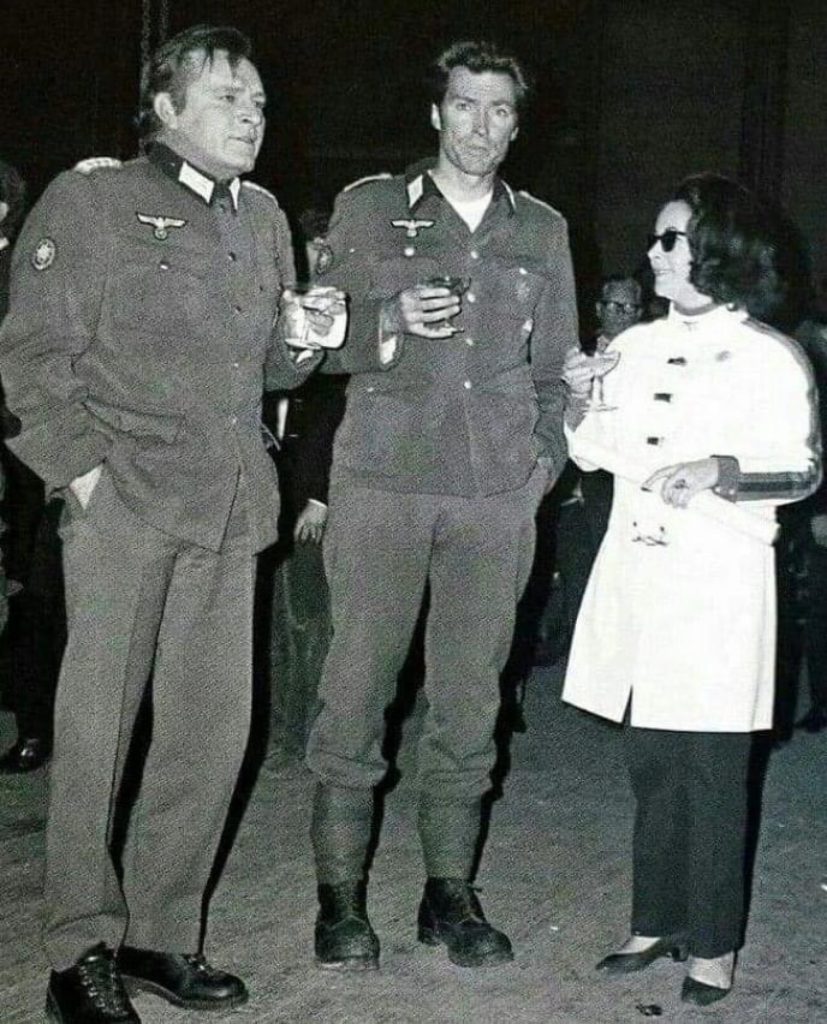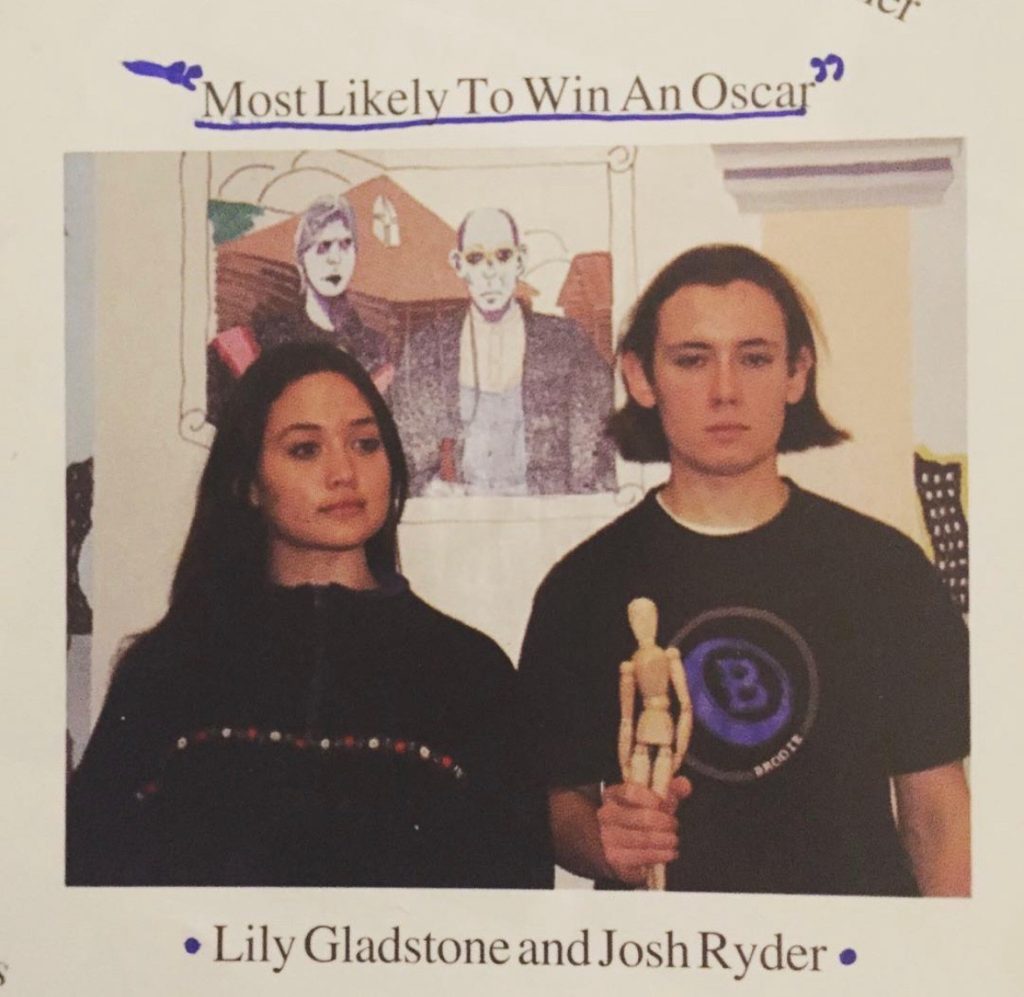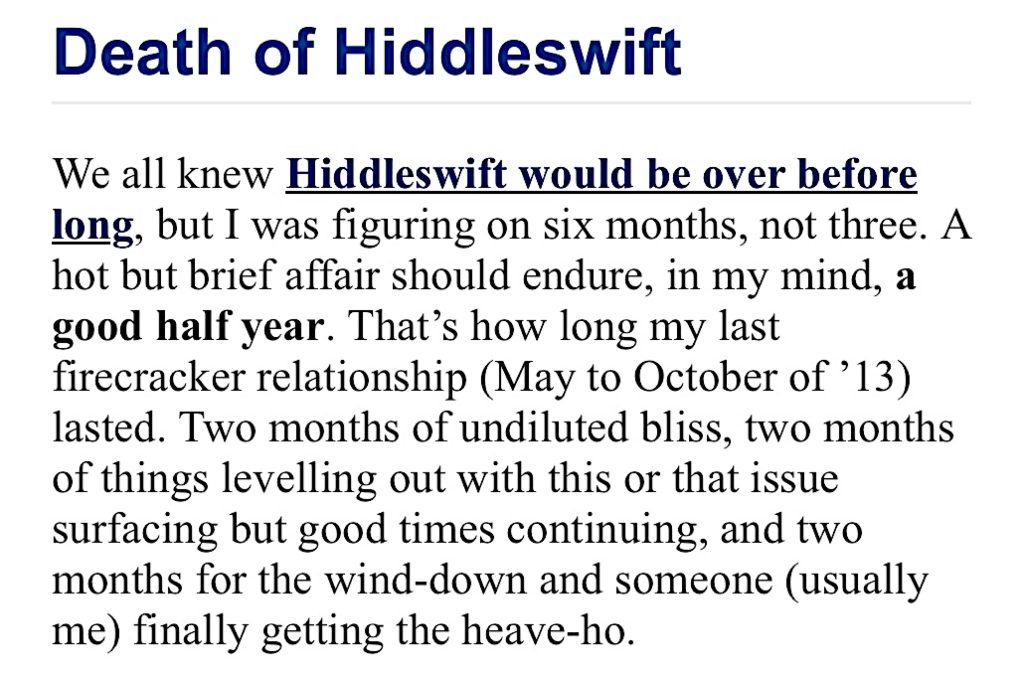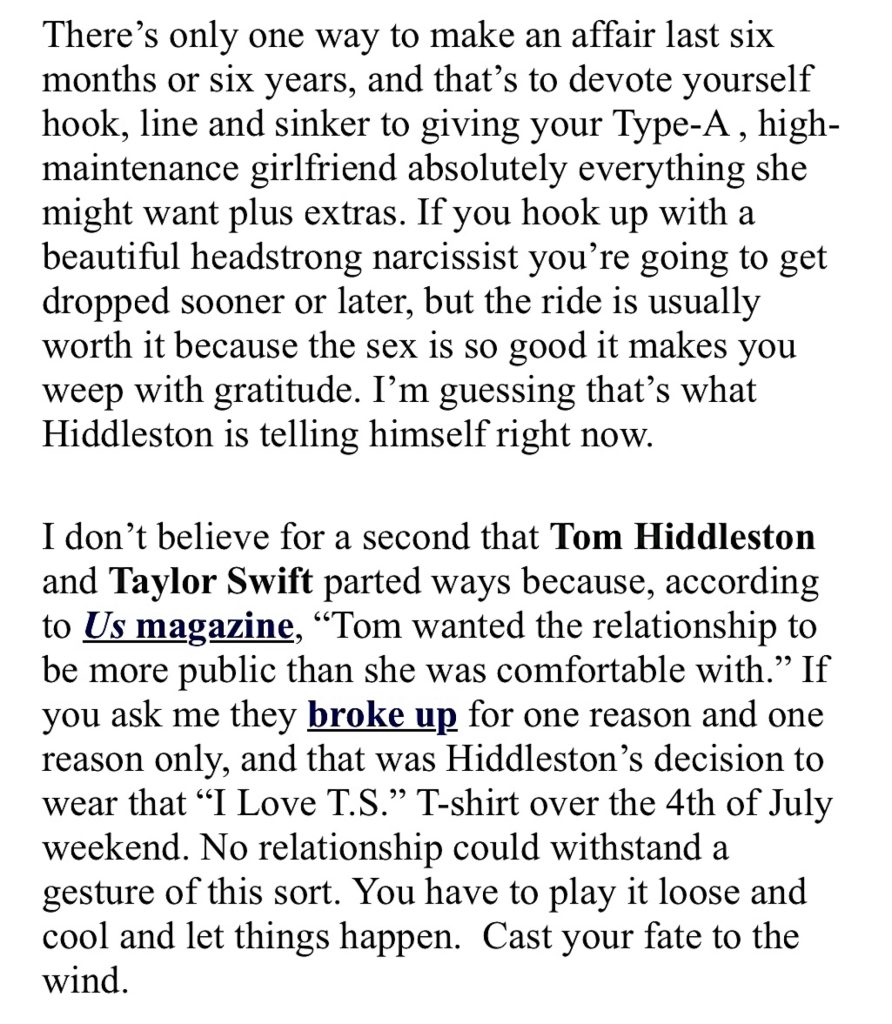This is some kind of optical photographic distortion. Richard Burton (5’10”) seems too large compared to Clint Eastwood (6’4″). Elizabeth Taylor was only 5’2″ — a stature sister of Kamala Harris.

This is some kind of optical photographic distortion. Richard Burton (5’10”) seems too large compared to Clint Eastwood (6’4″). Elizabeth Taylor was only 5’2″ — a stature sister of Kamala Harris.

I’m not going to say who, but during last night’s Montclair Film Festival screening of The Holdovers I was sitting next to a youngish guy (early 30s), and I could sense his vibe all through it and that he wasn’t exactly grooving with pleasure.
I could tell that he was okay with it in a subdued way, but the crowd (mostly GenX and boomers) was chuckling and guffawing left and right. The Holdovers is nothing if not full of sly, cutting humor and lacerating putdown lines that are cavalier and half-mean and yet sometimes heartfelt. And so this guy’s silence felt a tiny bit ominous.
And then around the two-thirds or three-quarters mark, he looked at his watch. That told me everything. The under-40s are going going to respond to this film with a little resistance.
Given that The Holdovers is set during the ’70 to ’71 Christmas and New Year’s holiday, obviously people who were around back then are going to relate more than Millennials or Zoomers. Nobody’s disputing this — seemed obvious from the get-go.
But Payne’s film is about much, much more than just savoring the nostalgia vapors and the exactly-right period aura and all the atmospheric trimmings. It pays off in dozens of deep-down ways, and I thought the fact that it’s obviously an excellent film, and one that exudes complete confidence in iself…I thought this obvious fact might start to win this guy over. But it didn’t.
Not to mention that slender, physically glowing quality. And yet I was fairly full of despair at 17 and 18. I felt no real hope and excitement about anything until I hit 25 or 26. And then slowly and very gradually, the pieces of the puzzle started to fit together.

It has long been my opinion that any Oscar-season pundit who professes to truly love and recommend too many films for Oscar glory…anyone who pours out award-season love too generously is, in my humble opinion, a kind of slut.
Say what you will about Hollywood Elsewhere but I don’t sell praise and affection as a rule. When I express love for a film or a performance or some other significant cinematic achievement in whatever category, it means something. Okay, now and then I’ve moderated or tempered my opinions in exchange for ads, but spottily.
What 2023 award-season contenders has Hollywood Elsewhere passionately gone to bat for so far? Which films do I, Jeffrey Wells, seriously love and admire as we speak? I’m just stating this plain and straight because all my life I’ve been in this racket for those rare poutpourings of love, awe and excitement.
Unlike the gladhanders, I have strict standards. I don’t think it means anything if your standards are overly elastic. Then again I’m not a hate factory. The wokester killers and suppressionists have tried to characterize me as such, but love means nothing if you’re not picky.
HE LOVE: Alexander Payne‘s The Holdovers. Yorgos Lanthimos‘ Poor Things. David Fincher‘s The Killer. Michael Mann‘s Ferrari. Tran Anh Hung’s The Taste of Things. Almost certainly American Fiction and Napoleon, although I haven’t yet seen them. Plus I earnestly respect and admire the impact that Barbie and Oppenheimer had las summer. That’s nine at the top of the list….nine!
Not to mention Errol Morris‘s The Pigeon Tunnel, Ilker Çatak’s The Teacher’s Lounge (official German submission for Best Int’l feature), Aki Kaurismäki‘s Fallen Leaves. Call it twelve.
And let’s not forget Jean-Stephen Sauvaire’s Black Flies, which I tumbled for in Cannes last May. (And I don’t care what Manohla Dargis thinks of it.)
Plus Guy Ritchie‘s excellent The Covenant, Christian Mungiu‘s RMN, Cruise & McQuarrie‘s Mission: Impossible — Dead Reckoning, Part One, Ari Aster‘s Beau Is Afraid, Jonathan Glazer‘s The Zone of Interest. Ben Affleck‘s Air. And…uhm, okay, Celine Song‘s Past Lives to a modest extent.
Mainly because he was taking shots at my hero, President Barack Obama, during the 2012 election. Now I’m telling myself realizing that Romney wasn’t actually so bad, and that this country is much worse off because there are no more classic, candidly-spoken “classic” Republicans. Center-stage-wise, all we have in this regard is Nikki Haley and Chris Christie.
Alexander Payne at Middleburg Film Festival on 10.21: “You want your movie to be as short as possible. There are too many damn long movies these days…if your movie’s three and a half hours at least let it be the shortest possible version of a three half hour movie…like The Godfather Part II [and] The Seven Samurai are super tight three and a half hour movies and they go by like that. So there’s no ipso facto judgment about length.”
I’m not saying the director of The Holdovers was specifically refererring to Killers of the Flower Moon when he said the above, but is there anyone on the planet earth who didn’t immediately presume that he was referring to Martin Scorsese‘s elephantine murder saga?
The truth is that relatively few three-hour-plus movies are regarded as painfully slow. Most of them work on their own sprawling terms.
I wouldn’t have said a word if Michael Mann‘s 170-minute Heat had been 10 minutes longer…hell, a half-hour longer! There’s a certain endless splendor to Sidney Lumet‘s Prince Of The City, which runs 167 minutes….it could have easily run 15 or 20 minutes more withut diminishment. The 227-minute Lawrence of Arabia is pure butter, pure icing, pure symphony…it never lags or drags, Ditto the 197-minute Spartacus.
Some three-hour-plus films, however, contain drop-out moments — plot triggers that encourage a sudden lack of interest or prompt viewers to space out or otherwise disengage.
For me, the drop-out moment in Killers of the Flower Moon begins at roughly the half-hour mark…I’m sorry but when I realized I was more or less stuck with Leonardo DiCaprio‘s dumb-as-a-fencepost Ernest Burkhart and Robert DeNiro‘s drawling, tedious and endlessly repetitive King Hale…when I realized I would be hanging with these fucking dolts for the next three hours I fell into an increasingly deep depression. Not during the first viewing, mind (I was moderately engaged or at least respectful of the film when I saw it in Cannes) but when I saw it for a second time last Thursday night.
Part One of Gone With The Wind is fairly riveting — the drop-out moment comes when Scarlett O’Hara marries Frank Kennedy, or roughly 35 minutes into Part Two. It’s all downhill from then on.
The Barry Lyndon drop-out moment comes when Ryan O’Neal blows pipe smoke into the face of Marisa Berenson. It marks the beginning of Lyndon‘s “dead zone,” which I explained in detail nearly seven years ago.
The drop-out moment in the 212-minute Ben-Hur comes after Judah Ben-Hur (Charlton Heston) vanquishes the evil Messala (Stephen Boyd) in the climactic chariot race. Ben-Hur is basically a betrayal-and-revenge movie, and once Judah’s revenge has been achieved there is no more movie. Nobody cares about Judah’s sisters being cleansed of leprosy or Judah being purged of his anger and bitterness by the blood of the crucified Jesus Christ. It doesn’t fucking matter!…nobody cares!…the post-chariot-race stuff is pure denouement.
Put another way, life is hard no matter how you slice it, and, to quote John Lennon, “there aren’t no Jesus gonna come down from the sky.”
That white-ish, elephant-collar jacket adorned with primitive paintings of divebombing bluebirds and whatnot…that plus the douchey whitewall buzzcut, the troglodyte stubble ‘stache and nascent beard, the open-collar white shirt and those godawful brown pants.
Life is nothing if not style choices, and when you wear a light brown double–breasted suit jacket for an SNL hosting gig, you’ve pretty much confirmed that you’ll never, ever “get it.” Amiable aw-shucks personality aside, your future is mapped out, bro…you’ve pretty much cancelled your own ticket.


